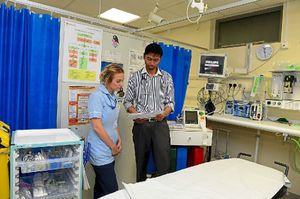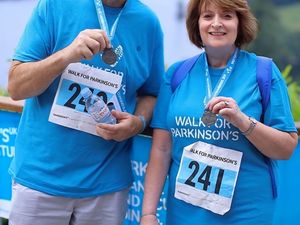More nurses leaving NHS in Shropshire than join
More nurses left the health service in Shropshire last year than joined, new NHS figures show.

The figures from NHS Digital show 120 walked away last year in the county, while only 103 joined.
In England, more than 33,000 walked away last year – with the number of leavers surpassing the number of those joining the workforce by 3,000.
The Royal College of Nursing (RCN) is urging ministers to act.
Shropshire's hospitals are training associate nurses to fill the gaps, but West Midlands director at the RCN, Mike Adams, said the figures were "worrying".
He said: "I think nurses are now working under extreme pressure. It's a very complicated highly skilled job and the conditions of work are becoming increasingly tough for nurses.
Worrying
"It's unprecedented levels of pressure and strain now and it becomes very hard and demoralising very quickly if you can't deliver the standard of care that you feel you should be able to deliver."
Speaking about the numbers leaving, he said: "It is really worrying and the warning signs have been there for a while.
"Organisations like the RCN have been flagging this for quite a long time. If you don't invest in nurses, if you don't value nurses, then it's not going to be an attractive job and people aren't going to stay in that job."
He said nursing students no longer receive bursaries and instead have to take on student loans, which may discourage some people from joining the profession.
Going forward, Mr Adams said the government needed to focus on how the NHS will be funded in the future.
He said: "We need to accept that demand is going to increase as our population ages and increases.
"It's not just hospitals. We have to invest in our community services, in our health visitors, in our district nurses, in our GP services, in our general practice nurses, to make sure that the whole system is set up to look after people in the best place for them, so we avoid people needing to come to hospital as a last resort all the time."
Professor Jane Cummings, England's chief nursing officer based at NHS England, said: "We do lose people that need to be encouraged. We're in the process of bringing in lots of nurse ambassadors that are going to be able to talk about what a great role it is, to be able to tell their story, so we can really encourage people to enter the profession and for those in the profession, to stay in it."
She said the NHS was trying to make nursing more attractive, adding: "We are beginning to see some fantastic good practice giving people flexible, rewarding careers. The key is getting it everywhere."
Meanwhile the Government is increasing the number of nurse training places by 5,000 this year – a rise of 25 per cent.
Nursing profession must be valued
The role of nursing has changed over the decades and more needs to be done to brand the profession, a Shropshire health boss has said.
Deirdre Fowler, director of nursing, midwifery and quality at Shrewsbury and Telford Hospital NHS Trust, says valuing the profession and improving conditions that nurses work in are important factors in attracting a workforce.
She said: “My mother was a nurse and I guess I always had her as a role model.
“I saw the difference she made to our local community and I wanted to replicate that, but also when I trained as a nurse, nursing was a career of great esteem and pride.
“I wanted a career that was valued and nursing offered me the opportunity to travel and have lots of variety in my work life.
“Nursing has changed quite significantly over the years, but nurses still require the prerequisite of compassion and really good communication skills.
“The profession of nursing has been bruised over the last couple of years and we really need to do a lot more as a health service, and as public, to value our nurses more.
“The skills that nurses need now are quite different than when I trained.
“The nurses need to be far more resilient now.” She said becoming a nurse was also academically challenging and nurses needed to multi-task.
She added: “I think we would need to do a lot more to brand the profession of nursing and there’s a lot of research that talks about appealing to the four generations of nurses.”





